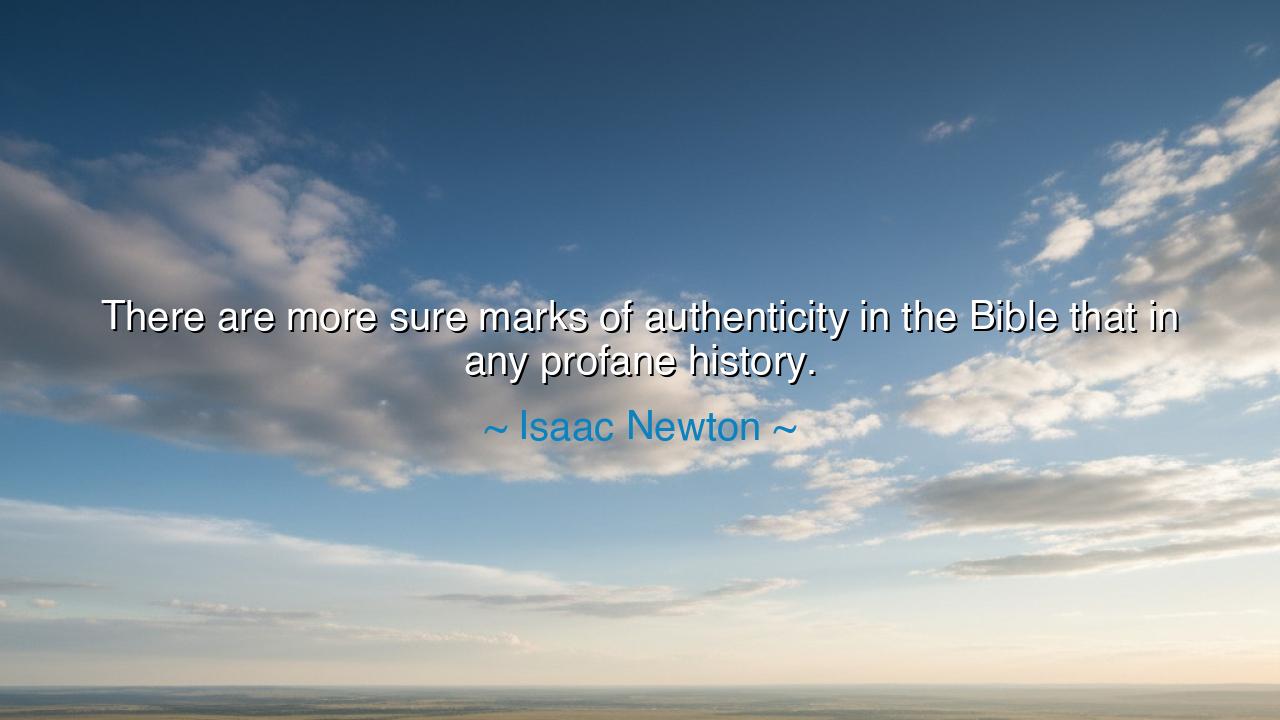
There are more sure marks of authenticity in the Bible that in






“There are more sure marks of authenticity in the Bible than in any profane history.” Thus spoke Isaac Newton, the great philosopher of nature, who unlocked the laws of the cosmos and measured the movement of the heavens, yet bowed his mind before the mystery of divine truth. His words are not those of a preacher, but of a seeker — one who saw in the sacred text not superstition, but the enduring harmony of truth and reason. In this saying, Newton declares that within the pages of the Bible lie deeper and more trustworthy signs of reality than can be found in the chronicles of kings or the annals of men. For while human histories fade with time and bias, the sacred word endures — written not merely by hands of flesh, but by the spirit of ages.
To understand this, one must see the world as Newton saw it: not as a battleground between faith and science, but as a single divine creation. The same mind that revealed the law of gravity, that traced the paths of stars and planets, also sought the order of God in Scripture. To Newton, both nature and revelation were books of truth — the one written in the language of mathematics, the other in the language of spirit. Yet he found that the Bible, though ancient and humble, contained a unity, a prophetic depth, and a moral coherence that no human historian could invent or sustain. In its poetry and prophecy, he discerned not chaos, but cosmic design — the same design he perceived in the orbit of worlds.
When Newton speaks of “profane history,” he refers to the records of earthly power — the stories of empires, wars, and rulers, which claim truth but are clouded by pride. These histories are written by men for men, shaped by victory and vanity, each proclaiming itself immortal until it too turns to dust. Yet the Bible, born from desert prophets and humble fishermen, survives the fall of every kingdom. Its wisdom transcends language and empire, reaching beyond the ambition of any single author. The kings of Egypt and Rome wrote to glorify themselves; the prophets of Israel wrote to glorify truth — even when it condemned their own people. This, Newton believed, was the surest mark of authenticity: that the sacred text speaks with honesty, not flattery, and reveals the heart of man as no courtly historian ever dared.
Consider how history itself has borne witness to this endurance. The empires that once ruled the earth — Babylon, Persia, Greece, Rome — are now names carved upon ruins. Their chroniclers have perished, their languages forgotten by most. Yet the Bible, older than them all, is read still in every tongue beneath the sun. It has outlasted persecution and fire, survived the contempt of philosophers and the cruelty of tyrants. It has been smuggled through prisons, whispered in cathedrals, and carried into the wilderness by those who would rather die than see it silenced. Newton saw in this not chance, but divine preservation — the hand of eternity guarding the message of truth.
Even in the age of Enlightenment, when reason rose like a new dawn over the earth, Newton stood apart from those who mocked faith. He did not see the Bible as the rival of reason, but its foundation. The stories of Genesis and Revelation, of covenant and redemption, were to him the mirror of the same order he studied in nature. Just as every planet obeyed its invisible law, so too did the moral world obey the unseen order of divine justice. In this harmony between the physical and the spiritual, Newton found assurance that truth is one — that the God who made the stars also spoke through Scripture.
Yet his words are not only for the devout; they are for all who seek truth with humility. For Newton’s “marks of authenticity” are not proofs of blind faith, but signs discerned by an honest mind — coherence, endurance, selflessness, and the power to transform the human heart. The Bible, he saw, was not a relic of myth, but a living witness: a text that outlasted ages precisely because it speaks to something eternal within mankind. Where human history records what men did, sacred history reveals what men are — frail, striving, flawed, yet forever drawn toward light.
So, my child of the future, learn from Newton’s wisdom: seek truth wherever it is written, but learn to recognize its signs. In science, truth is found through observation; in history, through memory; but in the spirit, through revelation. Do not scorn the sacred as superstition, nor worship the human as perfect. Read the Scriptures not only for belief, but for understanding — for in their parables and poetry lies the story of humanity itself. And when you study the works of man — his wars, his kingdoms, his inventions — measure them against the light of truth that does not change.
For as Isaac Newton taught by word and example, the universe itself is a divine manuscript, and all our learning, whether of stars or of souls, is but the reading of its lines. The Bible, that ancient book, is not an artifact of ignorance but a vessel of wisdom that has guided generations through both darkness and discovery. Let it remind you that the pursuit of knowledge, when joined with reverence, does not divide faith from reason — it unites them. And in that union lies the greatest truth of all: that the same mind which governs the cosmos also speaks, gently and eternally, to the heart of man.






AAdministratorAdministrator
Welcome, honored guests. Please leave a comment, we will respond soon